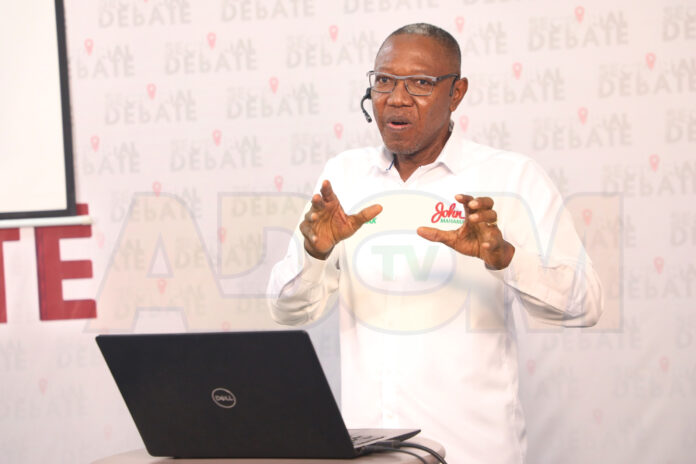The recent letter by the Conference of Heads of Assisted Secondary Schools (CHASS) to the Minister for Education, dated 20th December 2024 and titled “Urgent Request for Release of All Outstanding Funds to Schools”, has not only gone viral but has raised questions requiring answers from both CHASS and President Akufo-Addo.
Rather belatedly, CHASS profusely chronicles and laments the financial challenges confronting our secondary schools under the free Senior High School (free SHS) Programme. According to CHASS, it would advise against the reopening of secondary schools on January 3rd, 2025 if all outstanding funds are not paid.
The question many are asking is this: Why has CHASS been quiet about Akufo-Addo’s indebtedness to his so-called flagship policy all this while? Equally, many Ghanaians are asking why Akufo-Addo has failed to meet his obligations to his so-called flagship policy when all budgetary requests made to fund the free SHS policy since 2017 have been approved by parliament.
Until recently, the free SHS policy had been touted as the most impactful policy during Akufo-Addo’s two-term administration. The governing New Patriotic Party (NPP) put it front and centre in its 2020 campaign messaging and again in the just-ended 2024 elections.
However, post-election developments in the education sector have spoken volumes of the significant challenges that have handicapped the programme. Most of the problems can be summed up in one word, DEBTS on all fronts.
In the CHASS letter dated December 20, 2024, the association itemised several debts the government owed to its schools. It noted that the arrears stemmed from recurrent monies owed to the schools, perishable items, transport funding, and utility bills.
Figures from CHASS show that the debts it is currently demanding that the government pay began accruing some four years ago.
In 2021, available data shows that recurrent arrears for SHS 1 and SHS 2 students were left unpaid in the second semester. Second-year students in transition schools were not also catered for in funding as the debts piled up.
The story worsened the following year when throughout the first year of the succeeding academic year, recurrent arrears expected to take care of SHS 1, 2, and 3 students were not paid.
In the second semester of 2022, the government paid half of the recurrent arrears to the transition schools for third-year students. For SHS 1 students who were in school that semester, the lingering arrears were not paid.
The year 2023 was not different in any way. The government continued to kick its debts down the trail, failing to settle them for the SHS 1 students who were in school in the first semester.
As the year progressed to give way to the second semester, recurrent arrears remained as managers of the education sector were unable to pay any of such debts to the transition schools. This affected all second-cycle students in those institutions.
Only the examination fee component was paid to the transition Day and Boarding schools in the first semester of the 2023/2024 academic year with the remaining debts outstanding. The second semester was more of the same given that it was only the examination fee component that was paid to all the schools.
Debt owed to the public SHS has hardly come as a surprise following the West African Examination Council’s (WAEC) unusual public pronouncements about debts owed it. Figures from CHASS show that the administration has paid 50% of its arrears with respect to the West African Senior Secondary Examination (WASSCE) practical for the 2022 and 2023 Academic Years.
All these debts point to a pattern of funding constraints dating back to the first year of President Akufo-Addo’s second term. Despite these challenges, President Akufo-Addo accused those who genuinely raised concerns about the poorly implemented free SHS policy as naysayers and even went ahead to accuse them of seeking the downfall of the policy.
In the face of all these, CHASS was silent, only cautioning in the dying hours of the outgoing government that schools cannot be reopened if the arrears are not paid. It would have been in the national interest, for CHASS to have raised these concerns when Akufo-Addo and his appointees peddled falsehoods about the policy all these years.
In eight years, from 2017-2024, the total amount allocated to and approved by parliament for free SHS is Ghc15.5 billion. The logical question then is, why is the Akufo-Addo/Bawumia government indebted to free SHS as captured in the CHASS letter?
Given the quantum of funds approved by parliament for the implementation of the policy over the years, the only logical conclusion to arrive at is that Akufo-Addo and his appointees may have misappropriated or diverted funds to other activities unrelated to free SHS. Consequently, a call for a probe into free SHS expenditures from 2017-2024 by the incoming John Dramani Mahama government is justified.
No doubt, free SHS is a laudable policy, but the incompetent and corrupt Akufo-Addo government managed it poorly, as confirmed by CHASS’s letter of lamentations. It is, therefore, not surprising that Ghanaians overwhelmingly voted for President-elect John Dramani Mahama to improve and sustain free SHS.

